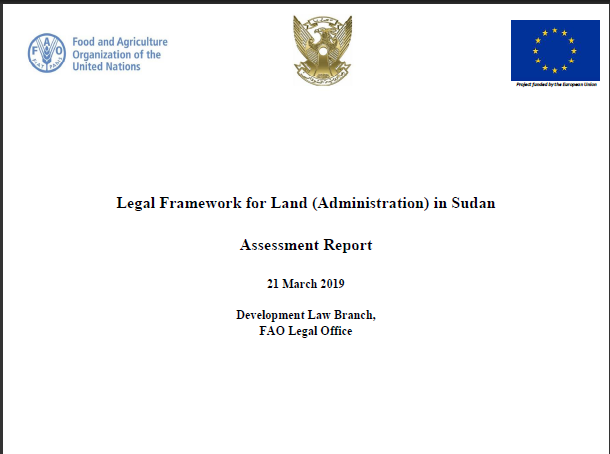Periurban areas of growing cities in developing countries have been conceptualised as highly dynamic landscapes characterised by a mixture of socioeconomic structures, land uses and functions. While the body of conceptual literature on periurban areas has significantly increased over the past…
This report assesses the legislation of Sudan relating to land tenure and administration (see the list in the Annex to this report) against the provisions of the Voluntary Guidelines on the Responsible Governance of Tenure of Land, Fisheries and Forests in the Context of National Food Security (…
The livelihoods of hundreds of millions of people, particularly the rural poor, are based on secure and equitable access to and control over land and natural resources which are in turn the source of food and shelter, the basis for social, cultural and religious practices, and a central factor…
Land and natural resource tenure security is a central yet often neglected area for economic development and poverty reduction in the developing world. Land is fundamental to the lives of poor rural people. It is a source of food, shelter, income and social identity. Secure access to land…
In recent years, a new era of interventionism has emerged targeting the development of African cities, manifested in ‘fantasy’ urban plans, surging infrastructure investments and global policy agendas. What the implications of this new era will be for specific urban contexts is still poorly…
Background
Safety and wholesomeness of milk intended for human consumption are influenced by various interlinked factors. However, information on what these factors are, especially in the pastoral traditional communities of Ethiopia, is largely lacking. The objective of this study is to…
New research by the Quantifying Tenure Risk (QTR) initiative has revealed that land disputes can cause losses of up to $101 million across a range of agricultural projects in Africa, while at the same time causing significant harm and stress to local communities who have a claim to the land.…
Tenure disputes – or disputes over claims to land and natural resources – are endemic in emerging market agricultural land investments.
In this brief, the Quantifying Tenure Risk (QTR) initiative give an overview of key findings from their new research into the costs associated…
Depending on the size and location of their investment, oil palm producers and investors risk losing between $8.3 and $22.1 million due to operational delays caused by active land tenure disputes. These numbers have emerged from the Tenure Risk Tool (TRT), a due diligence tool designed by the…
New research by the Quantifying Tenure Risk (QTR) initiative finds that land disputes in the African sugar sector often cause long and costly delays, with 46% of disputes lasting over 10 years. Half of these are still unresolved today. In serious cases disputes close projects down, causing…
Tenure risk – or the risk of dispute between investors and local people over land or natural resource claims – is endemic in emerging markets. There are hundreds of recorded incidents of tenure disputes creating delays, violence, project cancellation and even bankruptcy at a corporate level.…
For people around the world, land is more than a commodity to be bought and sold, developed and exploited. Land is home, heritage and livelihood. Land is life. Millions of men and women bear the brunt of political and grand corruption in relation to land: when they are not involved in decision-…











